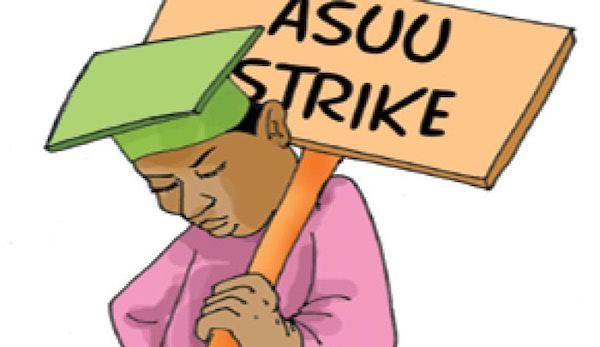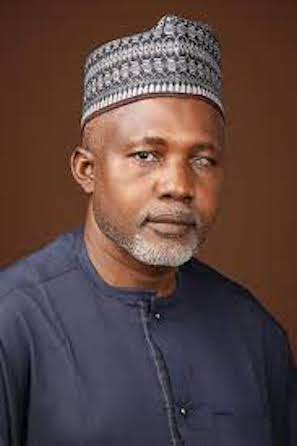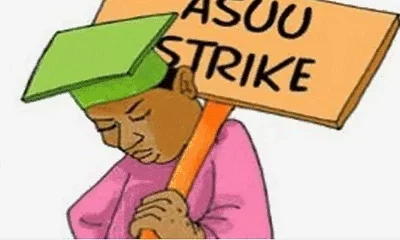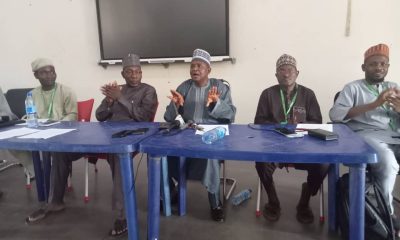Education
ASUU Strike: For Quick Resolution Refer Dispute to Chartered Institute of Arbitrators

By Aare Afe Babalola
Since the Academic Staff Union of Universities, ASUU, commenced its strike on February 14, 2022, there had been no headway in the resolution of its dispute with the Federal Government.
All reconciliation meetings held between the Federal Government and members of the Union had met brick walls.
With the end of its earlier warning strike ending on May 8, ASUU announced another “roll-over” 12-week strike action commencing on May 9, 2022.
The Union’s communique reads: “After extensive deliberations, noting Federal Government’s failure to live up to its responsibilities and speedily address the issues raised in the 2020 FG-ASUU Memorandum of Action, within the additional eight-week roll-over strike period declared on March 14, 2022, NEC resolved that the strike be rolled-over for 12 Weeks to give government more time to satisfactorily resolve all the outstanding issues.
Reactions: The National Association of Nigerian Students threatened to embark on a nationwide protest, to block all airport roads, disrupt political party primaries, and block the National Assembly until their voices are heard.
Several stakeholders, including the Aare Ona Kakanfo of Yorubaland, Iba Gani Adams, lent their voices in decrying the extension of the strike action and further called on the stakeholders to resolve it, citing the effect of any further strike on the students.
The Minister of Labour and Employment, reacting to the announcement of a further strike, noted that the action is being carried out in breach of the labour laws. In context, he reportedly stated as follows: “Ministry of Labour and Employment is not the direct employer of the university teachers.
The process is that whenever ASUU has a problem with the Federal Ministry of Education, which is their direct employer, the ministry will have to try and resolve it using its internal dispute resolution mechanisms.
So when there is a breakdown in negotiations, and I apprehend the dispute on my table, and the workers refuse to go back to their work while discussions are ongoing, it is a breach of the labour law. We had apprehended the ASUU strike, we did that on February 22, and we continued the conciliation on March 1.”
Why was ASUU established?
The Academic Staff Union of Universities, ASUU, was founded in 1978 primarily to demand the rights of academic staff in the country’s Federal and state universities. In carrying out this mandate, the Union has never shied away from embarking on warning and indefinite strike actions, as well as acting as a watchdog against corruption by its members who hold key positions in its member institutions.
Under the presidency of Dr. Oladipo Fashina, the Union petitioned the Independent Corrupt Practices Commission in July 2002 to investigate the University of Ilorin’s management for financial mismanagement and corruption.
In May 2008, the Union began a series of warning strikes to press a number of demands, including an improved salary scheme and the return of the pension system. In June 2009, the Union issued an indefinite strike order to its members at federal and state colleges across the country due to differences with the Federal Government over an agreement struck around two and a half years earlier.
The Union went on strike again on July 1, 2013, for five months and 15 days. The Union sought proper financing and the revitalisation of public universities, as well as the payment of their earned allowance, which was N92 billion in arrears. One thing is certain: the Union has always been outspoken in its opposition to what it sees as unfairness to its members, and it has been in the forefront of the fight for the revitalisation of public tertiary education.
It should be remembered that the proliferation of institutions in Nigeria drew the attention of ASUU leadership, who spoke out against what it dubbed “constituency initiatives”. According to reports, National President, Professor Emmanuel Osodeke, stated that: “Our position on that had been that the Federal Government is toying with the future of the society.
They are turning universities into constituency projects, where every village must have a higher institution; the purpose is not to have good universities and a good environment for academic excellence. Every politician wants to have a university in his village.
“This is not how a system is run. They are establishing a university of Medical Sciences and other specialised institutions, why not go and fund those old universities so that you can upgrade the Faculty of Medical Sciences to professional standards, so that Nigerian politicians, including the President, who usually go outside the country for medical attention, will have their medical issues solved here.
“But we will not do that; rather, the Federal and state governments are busy establishing mushroom universities. It is very unfortunate. But as a union, we are also thinking of what we can do in the future to compel them to stop this.
One of the things we did in the earlier agreement was that we agreed that the National Universities Commission, NUC, law should be reviewed to make it almost impossible for any governor or Federal Government to start a university without adequate preparation for funding for over 10 years.
But till now, that resolution has not been implemented. What we are saying is that the law should be reviewed to give NUC power to ensure that before you can start a university, you have to show good evidence that you can fund the system.”
To pursue its demands, the Union has always used warning and/or indefinite strike measures. Naturally, the Union’s strike activities have always elicited differing viewpoints and reactions from those directly or indirectly impacted. Government views the Union as too critical, with the covert goal of presenting the government as reluctant to give the country’s education system the financial attention it needs.
Parents see the Union as a serious hindrance to their children’s or wards’ academic advancement, and perhaps as a stumbling block in reaping their benefits of investing on their children. Regardless of how the Union’s strike actions are viewed, one thing is certain: at the end of the day, everyone loses. Professor Christopher Imumolen of Togo’s Global Wealth University once remarked that the strike actions are an “avoidable tragedy resulting from systemic failure and an injury consciously inflicted on the future of youths”.
The way forward: With the seemingly endless strike action embarked upon by ASUU, the need to resolve all its outstanding disputes with the Federal Government has become more imperative than ever. While litigation may be a far stretch, I highly recommend that the parties resolve their dispute through alternative dispute resolution mechanisms, particularly arbitration.
Arbitration is not only binding and enforceable between the parties, but also more flexible as it allows parties more level of control in the process. It is generally less expensive considering the relatively short length of time it takes from commencement to delivery of an Award. Furthermore, arbitral hearings are held in private settings and are attended only by those designated by the parties and their counsel, in contrast to trial proceedings held at the courthouse, which are open to the public.
It is highly more likely that the current fiasco between the Federal Government and ASUU will be more quickly resolved to finality if the dispute is referred to Arbitration by both parties, preferably to the Chartered Institute of Arbitrator.
For the sake of the students whose hope for a timeous conclusion of their education hangs in an unascertainable balance, I plead that the parties should quickly refer their dispute to arbitration where the parties will be bound by the findings and award of the arbitrators.
Afe Babalola (SAN) is a legal luminary.
Education
NBTE Begins Accreditation of New Courses in Federal Polytechnic Wannue

The National Board for Technical Education (NBTE), has commenced accreditation exrceise for six new courses at the Federal Polytechnic, Wannue, Tarka Local Government Area of Benue.
Mr Ogah Ngbede, NBTE’s Director of Polytechnics Programmes, disclosed this on Thursday during the ongoing exrceise in the institution.
According to Ngbede, all the courses would be inspected before making a pronouncement.
He said that the exercise would last for two days, after which its decision would be made known.
He added that the institution secured full accreditation for two out of the five courses it presented to NBTE in 2023.
“We are here to look at the claims made by the institution because they have requested to commence some new programmes.
”We are here to ensure that the right thing is done and ensure that this polytechnic is not regarded or treated as a second grade institution,”he said.
The director, who decried poor funding of polytechnic education in Nigeria, called on goverment at all levels to ensure adequate funds were allocated to the education sector.
“The major problem affecting polytechnic education in this country is finance.
”Let me use this opportunity to call on the government at all levels to inject more funds into the polytechnic system.
“Technical education is a low hanging fruit from which this country can use to escape poverty; technical education all over the world has become a major currency with which nations are using to escape poverty.
“When we pay adequate attention to our polytechnics, students that graduate from these institutions can hit the ground running because they have the necessary tools to be job providers and not job seekers”, he said
Earlier, the Rector of the institution, Dr Tyover Ashinya, listed the courses presented for accreditation to include, Business Management, Public Administration, Agricultural Technology, Electrical Engineering, Computer Engineering and Computer Science
He said that the institution has the adequate manpower and infrastructures to effectively run the six new courses.
”We are willing to improve on all necessary areas that need improvement to enable these new courses secure full accreditation,”the Rector said.
Reports says that the institution was established by the Federal Government in December 2020. (NAN)
Education
FG Set to Revolutionise Educational Infrastructure with N98.2 bn – Edun
By Tony Obiechina, Abuja
The Federal Government has announced the ground-breaking ceremony for the building of a 1,600-capacity student hostel in Akwa Ibom State.
This project is part of a N98.2 billion nationwide initiative to enhance educational infrastructure.
The Minister of Finance and Coordinating Minister for the Economy, Wale Edun who disclosed this said the Federal Government, in partnership with states and the private sector, will construct 24 housing facilities across 24 institutions, each with 1,600 bed spaces.
According to a statement by Mohammed Manga, Director of Information & Public Relations, the initiative is aimed at addressing a significant student accommodation deficit, enhancing student performance and well-being.
It is also a testament to the sophistication and depth of our local capital marketsRepresented by the Ministry’s Permanent Secretary Special Duties Mr Okokon Ekanem Udo, the Minister added that
“this initiative invests in our youth and educational infrastructure, ensuring that tomorrow’s leaders have the resources and environment they need to thrive.
“It also demonstrates the private sector’s willingness and capacity to partner with government to deliver critical infrastructure projects across all geopolitical zones, to reduce the housing deficit*, Wale Edun said.
Education
FG in Land-Swap Deal to boost Literacy Education in Kano

By Eddy Ochigbo, Abuja
In a renewed move to enhance sustainable growth in education, the federal government has concluded plans to embark on 13 new infrastructure projects at the National Mass Literacy and Adult Education Commission (NMEC), Kano Centre, through Public/Private Partnership (PPP).
Minister of State for Education, Dr Yusuf Sununu, disclosed this on Tuesday at a stakeholders’ engagement and sensitisation meeting in Abuja to kick start the proposed land-swap deal for the development of critical infrastructure in Kano.
According to him, the public private partnership project would mark a turning point in literacy education of adults across the country, regretting that it was unfortunate that Nigeria still had a significant number of adults who are either illiterate or have limited literacy skills.
This major challenge, he said hinders the nation’s overall development and progress.“This is another milestone and progress in the ministry, and we will be having it with private public partnership, and this is also part of President Bola Tinubu’s eight-point agenda.Government cannot do it alone and everyone of us needs this as stakeholders to bring development and move the country forward. We have a regulation guiding us which we will use to ensure that the plots that have laid fallow over the years are put to best use in our time,” he said.
While stressing the need to regulate teaching in the country, specifically to guide teaching and teaching practice, Sununu revealed that the 13 new infrastructure projects – semi-detached two and three bedroom bungalows, state-of- the-art classrooms, clinic, library, hostels, a lecture theatre and recreational facilities, among others – would change the fortunes of the National Mass Literacy and Adult Commission, Kano centre, which has been lying fallow in the last 39 years.
“The projects would not only enhance learning at the centre, but would also provide a conducive environment for entrepreneurship in the centre. The Kano Centre of the National Mass Literacy Centre plays a crucial role in addressing this challenge by providing literacy education to adults across the country.
However, to effectively fulfil its mandate and reach more people, it is essential to have the necessary infrastructure and resources in place. This is where the proposed development of 13 critical infrastructures through land swap Public-Private Partnership comes into play. Through this innovative approach, we will be able to leverage the expertise, resources and capabilities of the private sector to create modern and functional learning facilities for the Centre,” Sununu enthused.
On his part, the Executive Secretary, NMEC, Prof. Simon Akpama, expressed confidence that through collective efforts and sustained collaboration between the public and private sector the growth of education would make a significant impact on the lives of a cross section of Nigerians. He said the initiative would also empower youths and adults to contribute their quota to national development.
Meanwhile, DAILY ASSET gathered that MASLAHA Homes and Development Limited, a leading Kano-based Real Estate company, which proposed the land-swap deal, has the capacity to design, finance and build the 13 new critical education infrastructure and assets for the Kano Centre of National Mass Literacy within the scheduled timeframe.
























